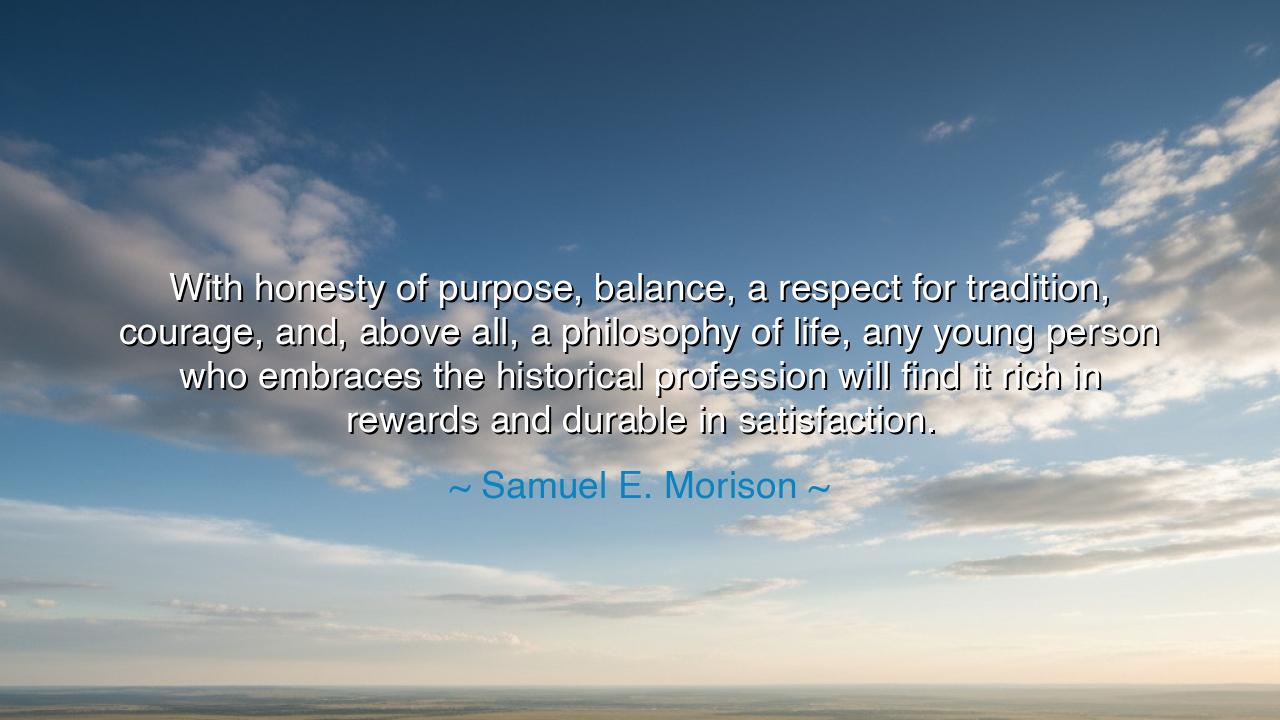
With honesty of purpose, balance, a respect for tradition
With honesty of purpose, balance, a respect for tradition, courage, and, above all, a philosophy of life, any young person who embraces the historical profession will find it rich in rewards and durable in satisfaction.






“With honesty of purpose, balance, a respect for tradition, courage, and, above all, a philosophy of life, any young person who embraces the historical profession will find it rich in rewards and durable in satisfaction.” — Thus spoke Samuel Eliot Morison, the great historian-sailor, whose life was a bridge between the living sea and the written word. His words, though addressed to those who seek to study history, are in truth a teaching for all who desire a life of meaning and integrity. For Morison reminds us that knowledge alone is not enough; it must be guided by honesty, balance, respect, courage, and a unifying philosophy of life — the eternal virtues that anchor the mind amid the tides of time.
The origin of this wisdom lies in Morison’s own life, which was a living testament to the union of thought and action. A scholar of Harvard and a sailor of the U.S. Navy, he believed that history was not a collection of lifeless dates, but a living voyage, a journey through the deeds, dreams, and errors of mankind. To him, the historian’s task was sacred: to preserve truth, to interpret it with fairness, and to transmit it to future generations with honesty of purpose. For Morison, history was a compass by which a civilization might find its way — but such a compass would fail unless its maker was guided by moral clarity. Without honesty, knowledge becomes deceit; without balance, judgment becomes tyranny. Thus, he urged the young to take up the study of the past not as a profession of convenience, but as a calling of the soul.
To act with honesty of purpose is to speak truth even when truth is unwelcome. The historian, like the philosopher, must not shape facts to suit fashion or power. Truth must be the historian’s only master. Yet, truth without balance can harden into dogma. To understand history is to see with both eyes — to weigh greatness and guilt, light and shadow, not as judge alone but as witness. And to do this rightly, one must hold a deep respect for tradition, not as a chain that binds, but as a thread that connects. For tradition, when understood, gives context and meaning to progress; it reminds man that every future is built upon the bones of the past.
Morison’s words also speak of courage — the courage to face not only the truths of the world, but the truths of oneself. To study history honestly is to confront the frailty of mankind: the wars, the cruelties, the folly. It takes courage to gaze upon such darkness and not turn away. Yet courage also means recognizing greatness where it exists — to honor the builders, the dreamers, the reformers who, despite their imperfections, lifted the human story upward. History demands a brave heart, one that neither despairs nor idealizes, but continues to seek the meaning behind every act of man.
And above all, Morison speaks of a philosophy of life — that vital flame which gives coherence to all effort. Without a philosophy, even knowledge becomes hollow, like a ship without a helm. The historian’s philosophy must rest on faith in the dignity of the human journey — that despite folly, cruelty, and failure, mankind continues to strive, to learn, to create. This belief gives purpose to the study of the past, for it transforms it from a record of ruin into a testament of endurance. A philosophy of life binds the heart to the mind, and gives history — and living — both direction and soul.
Consider the life of Thucydides, the Athenian chronicler of war, who wrote not for glory but for truth. He watched his city, radiant in culture and intellect, fall into ruin through pride and greed. Yet he did not turn his pen to rage or propaganda. He wrote with balance, preserving for future generations the lessons of hubris and the price of power. His courage lay not in arms but in intellect, his respect for tradition in his faith that mankind, even through error, might one day learn wisdom. He is the embodiment of Morison’s ideal — one whose philosophy of life made his work immortal.
So, my listener of the ages, take these words as your compass: whether you walk the path of a historian, a thinker, or any seeker of truth, live with honesty of purpose. Seek balance in judgment, hold respect for tradition, act with courage, and build your life upon a philosophy worthy of your heart. Do not chase mere success — seek meaning; do not crave reward — crave understanding. For the world does not remember those who live easily, but those who live truly.
For Morison’s wisdom is not only for historians — it is for all who would live well. To walk with integrity, to act with courage, to think deeply and love the truth — these are the elements of a rich and durable life. Embrace them, and your days will not merely pass; they will endure. For in the great book of time, only those who live with purpose and principle write their names in ink that does not fade.






AAdministratorAdministrator
Welcome, honored guests. Please leave a comment, we will respond soon